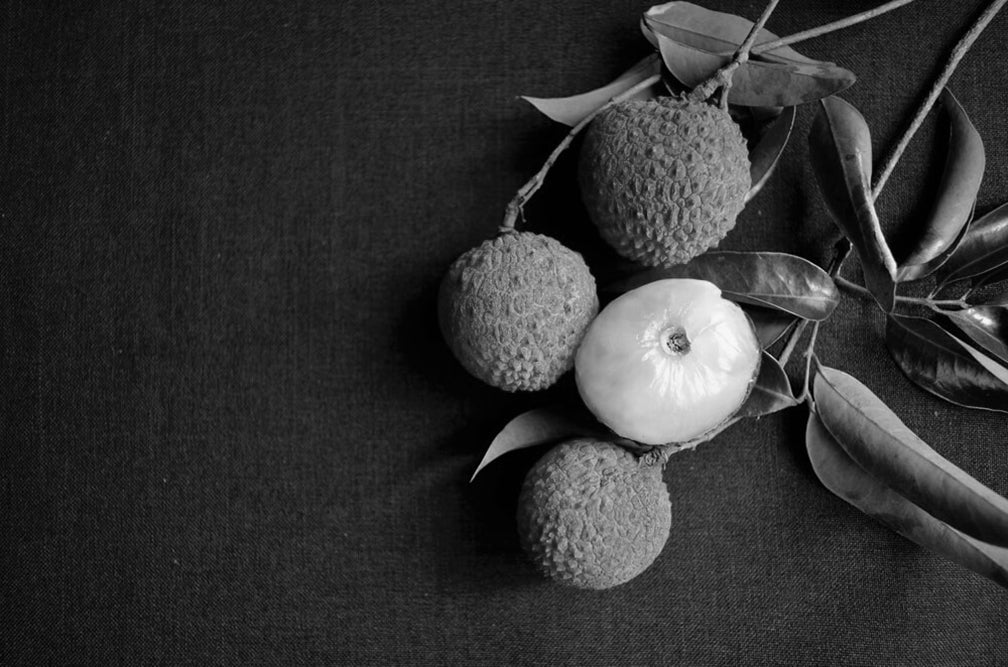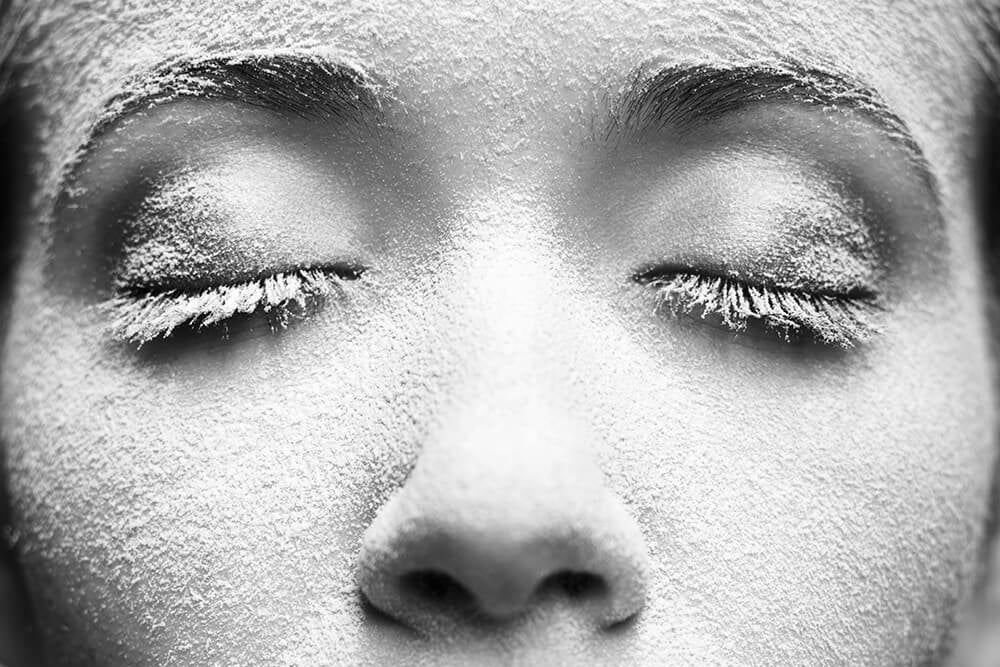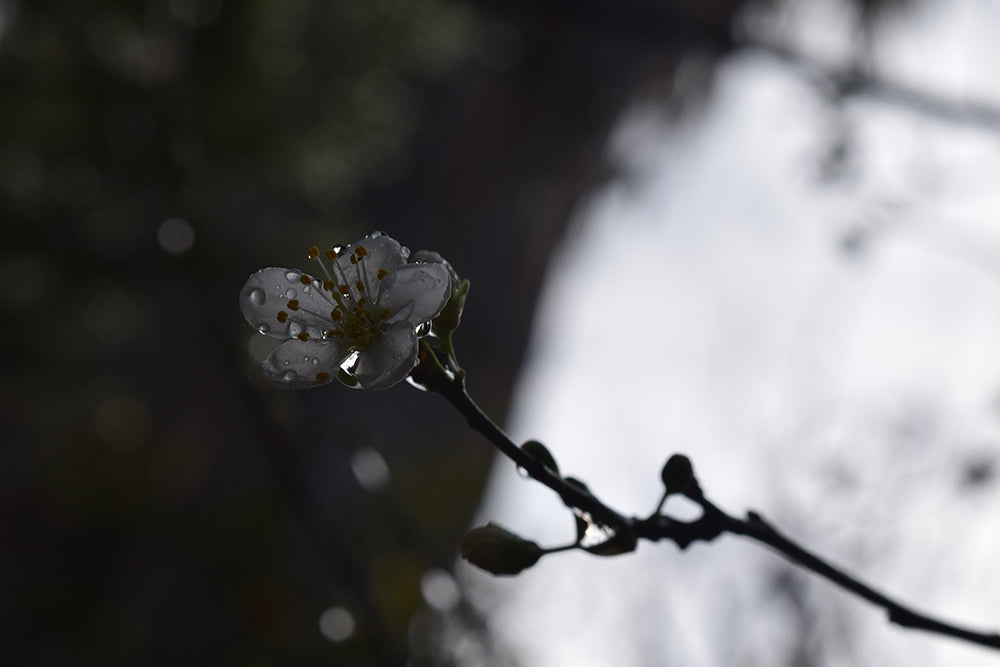
ingredient focus: lychee

the bottom line
it’s one of the stars in our lotus & lychee facial crème and white tea & lychee toner – lychee fruit. small and sweet, this diminutive beauty is a powerhouse of activity. from scavenging free radicals to brightening the skin, this little beauty has it all. read on to learn more about our new hero.
first layer: history
Lychee, or Litchi chinesis, is a medium-sized tropical tree native to southeastern China, where it has been grown for more than 3000 years. It’s now primarily found in China, Vietnam, Indonesia, Thailand, and the Philippines. The flowers themselves are small and white or pale yellow, while their fruits are (appropriately) heart-shaped or round and covered by a pink to red rind, or pericarp.
During the Han Dynasty in the 1st century, lychee fruit was a popular tribute item. The Imperial Court is reported to have relied upon a courier service consisting of fast horses to retrieve the fresh fruit from Guangdong. The Song Dynasty of the 2nd century also treasured the fruit, as recorded in the Treatise on Lychees by Cai Xiang. The Emperor Li Longji reportedly had lychee fruit delivered to him at great expense for the delight of Yang Yuhuan, his favorite concubine.
The European traveller Juan Gonzalez de Mendoza wrote of the fruit in his History of the Great and Mighty Kingdom of China, remarking on the praise given to the lychee by visiting Spanish friars in the 1570’s. Michal Boym, a Polish missionary, is believed to have finally introduced the lychee fruit to the West in 1656.
second layer: science
Lychee has traditionally been used to treat everything, from hypoglycemia, infection, cancer, and hyperlipidemia, to cough, pain, fevers, and excessive blood clotting. But there’s some real science behind all this tradition: lychee’s major chemical constituents include antioxidants*, such as flavonoids, tannins, and phenolic acids.
Recall that as we age, we’re exposed to injuries in the form of ultraviolet (UV) radiation, pollution, smoking, and alcohol, all of which can produce free radicals* (or, reactive oxygen species). These free radicals create oxidative stress and an inflammatory response which can damage DNA and result in injury to the epidermal and dermal layers of the skin. In the skin, this manifests as premature aging of the skin with decreased elasticity leading to increased wrinkling, age spots, and decreased skin tone.
Antioxidants to the rescue: they’re our skin’s superheroes for stressed skin. Antioxidants can stabilize free radicals, limiting their potential to damage the body. Topically, vitamins C and E and coenzyme Q10 (or ubiquinone) are some of the best-known antioxidants. Lychee fruit has been shown in multiple studies to possess significant antioxidant and even radio-protective (think, radiation damage) properties. When evaluated for free radical scavenging activity, the pericarp of lychee has actually been shown to exhibit more potent antioxidant activity than ascorbic acid, aka vitamin C.
Lychee fruit also has some significant brightening properties. Skin pigmentation occurs secondary to melanogenesis, a biochemical reaction which takes place in the basal layer of the epidermis. Melanin provides natural protection against UV rays, but can be deposited following UV exposure, with hormonal changes, and aging. Melanin is formed through a series of oxidative reactions which involve the amino acid tyrosine along with the enzyme tyrosinase. As a result, if this pathway is blocked by a tyrosinase inhibitor, the deposition of excess skin pigmentation can potentially be reduced. Lychee fruit’s pericarp has demonstrated an anti-tyrosinase effect.
The seeds of lychee fruit have shown activity against the growth of bacteria, including common strains such as Staphylococcus aureus, Streptococcus pyogenes, Escherichia coli, and Pseudomonas aeruginosa. They’ve even shown some anti-viral activity against herpes simplex (HSV-1) and HIV.
Finally, the leaves of the lychee tree have demonstrated anti-inflammatory, analgesic (pain relieving), and antipyretic (fever reducing) activity.
third layer: use
The remarkable antioxidant and anti-tyrosinase properties of lychee fruit make it the ideal ingredient to include in brightening, aging and wrinkle treatments. Our immune system likes this little fruit, too, with its ability to fight microbes and viruses. The anti-inflammatory properties suggest that it can be used for sensitive skin that needs a little extra TLC. This small fruit packs a big punch.
fourth layer: how we do it
We’ve incorporated lychee fruit into our lotus & lychee facial crème. Made with a botanical blend of lotus, lychee, plum, gotu kola, and elderberry, this light crème was created to gently replenish moisture in dry skin. Layer it on, morning and evening, after cleansing and toning. Find it also in our white tea & lychee toner, part of the anokha man capsule for sebum-rich skin.
xx
anokha
references:
- Ibrahim SRM, Mohamed GA. Litchi chinensis: medicinal uses, phytochemistry, and pharmacology. J Ethnopharm 2015; 174: 492-513.
- CP Khare. Indian Medicinal Plants. Springer-Verlag: Berlin/Heidelberg, 2007.
- wikipedia.org
- Kanlayavattanakul M, Ospondpant D, Ruktanonchai U, Lourith N. Biological activity assessment and phenolic compounds characterization from the fruit pericarp of Litchi chinensis for cosmetic applications. Pharmaceut Biol 2012; 50(11): 1384-1390.
- Saive M, Genva M, Istasse T et al. Identification of a proanthocyanidin from Litchi chinensis sonn. root with anti-tyrosinase and antioxidant activity. Biomolecules 2020; 10: 1347-1362.
- Kim YJ, Uyama H. Tyrosinase inhibitors from natural and synthetic sources: structure, inhibition mechanism and perspective for the future. Cell Mol Life Sci 2005; 62: 1707-1723.
- Bhat RS, Al-daihan S. Antimicrobial activity of Litchi chinensis and Nephelium lappaceum aqueous seed extracts against some pathogenic bacterial strains. J King Saud Univ-Sci. 2014; 26: 79-82.
- Besra SE, Sharma RM, Gomes A. Anti-inflammatory effect of petroleum ether extract of leaves of Litchi chinensis Gaertn. (Sapindaceae.) J Ethnopahrmacol 1996; 54: 1-6.
definitions:
antioxidant: an antioxidant is a compound that inhibits oxidation. free radicals cretae oxidative stress and an inflammatory response which in turn can damage DNA and result in injury to the epidermal and dermal layers of the skin. in the skin, this manifests as premature aging with decreased elasticity leading to increased wrinkling, agre spots, and decreased skin tone. antioxidants stabilize free radicals, which in turn limits their ability to damage the body.
free radical: an unstable molecule created during normal cell metabolism. free radicals can accumulate in cells, causing damage to other structures including DNA, lipids, and proteins.
melanin: melanin is a dark brown to black pigment occurring in the hair, skin, and iris of the eye. it's responsible for tanning of skin.
melanogensis: melanogenesis is the process for the production of melanin, the primary source of pigmentation in the skin.
faqs:
what is lychee?
lychee, or Litchi chinesis, is a medium-sized tropical tree native to southeastern China.



1 comment
[url=https://loveacademy.co.il/מה-לעשות-כאשר-יש-לך-דחף-מיני-חזק-משל-בת-ה/]דירות דיסקרטיות בחיפה[/url]
Dog
leave us a comment
This site is protected by hCaptcha and the hCaptcha Privacy Policy and Terms of Service apply.